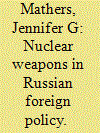| Srl | Item |
| 1 |
ID:
112155


|
|
|
|
|
| Publication |
2012.
|
| Summary/Abstract |
This essay is based on a close reading of speeches and other public statements made by Vladimir Putin and Dmitri Medvedev during their presidencies, covering the period 2000-2010. It argues that the pattern of presidential discourse reveals that both presidents have regarded Russia's nuclear weapons as primarily political rather than military instruments. Both Putin and Medvedev demonstrated a sustained desire to pursue strategic nuclear arms reductions through negotiations, particularly on a bilateral basis with the United States, and an interest in minimum nuclear deterrence. The shifts in position taken by both presidents on US plans for missile defence in particular reveal that they each attached as much, if not more, importance to Russia being regarded as an equal partner by the United States than to any strategic gains that might be achieved through preventing the deployment of an effective missile defence system.
|
|
|
|
|
|
|
|
|
|
|
|
|
|
|
|
| 2 |
ID:
172893


|
|
|
|
|
| Summary/Abstract |
At a time of technological and political change in the international security environment, Russia continues to view nuclear weapons as guarantors of peace and security among great powers. Nuclear weapons also assure Russia's own great-power status and mitigate uncertainty in an emerging multipolar order. In a world where the United States pursues improved missile defense capabilities and appears to reject mutual vulnerability as a stabilizing factor, Moscow views its modernized nuclear arsenal as essential to deter Washington from a possible attack on Russia or coercive threats against it. Some elites in Russia would like to preserve existing arms control arrangements or negotiate new ones to mitigate a weakening infrastructure of strategic stability. At the same time, however, they seem skeptical that the United States is willing to compromise or deal with Russia as an equal. Meanwhile, multilateral arms control appears to be too complex a proposition for the time being.
|
|
|
|
|
|
|
|
|
|
|
|
|
|
|
|